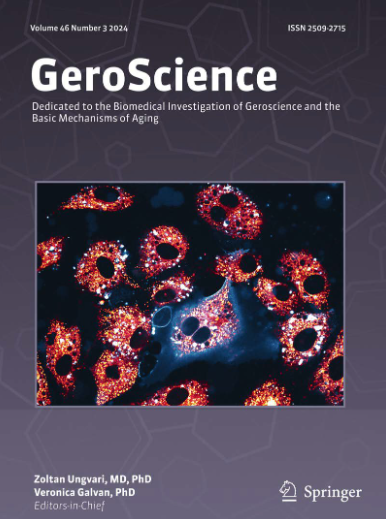Delirium in hospitalized COVID-19 patients is associated with dynamic changes in peripheral immune gene expression.
IF 5.4
2区 医学
Q1 GERIATRICS & GERONTOLOGY
引用次数: 0
Abstract
Delirium is a neurologic syndrome characterized by inattention and cognitive impairment frequently encountered in medically ill older adults. As a hallmark of age-related brain vulnerability, delirium offers a clinical model to investigate how peripheral immune responses contribute to acute brain dysfunction. Peripheral inflammation is a key trigger of delirium, but the patient-specific immune responses that drive delirium onset and recovery remain poorly understood. This retrospective cohort study of prospectively collected biospecimens examines RNA sequencing from peripheral blood mononuclear cells of adults hospitalized for COVID-19 to better understand patient-specific factors associated with delirium (n = 64). Longitudinal transcriptomic analyses highlight persistent immune dysregulation in delirium, marked by increasing expression trajectories of genes linked to innate immune pathways, including complement activation, cytokine production, and monocyte/macrophage recruitment. Genes involved adaptive immunity showed a declining trajectory over time in patients with delirium. Although corticosteroid treatment suppressed some aspects of immune hyperactivation, aberrant responses contributing to delirium were exacerbated. Delirium resolution was characterized by normalization of key transcripts such as CCL2 and innate immune markers. Novel associations with delirium included transcripts related to stress granule assembly and the T cell regulators DUSP2 and KLF10. Delirium in COVID-19 is associated with distinct and dynamic peripheral immune trajectories that are modulated by corticosteroids. Further understanding these mechanisms has important implications for preventing delirium in older adults. These findings provide novel mechanistic insights with translational relevance for immunomodulatory strategies targeting maladaptive immune responses to prevent or treat delirium in medically ill populations.COVID-19住院患者谵妄与外周免疫基因表达动态变化相关。
谵妄是一种以注意力不集中和认知障碍为特征的神经系统综合征,常见于患病的老年人。作为与年龄相关的大脑脆弱性的标志,谵妄提供了一个临床模型来研究外周免疫反应如何导致急性脑功能障碍。外周炎症是谵妄的关键触发因素,但驱动谵妄发作和恢复的患者特异性免疫反应仍然知之甚少。这项前瞻性收集生物标本的回顾性队列研究检测了因COVID-19住院的成人外周血单个核细胞的RNA测序,以更好地了解与谵妄相关的患者特异性因素(n = 64)。纵向转录组学分析强调了谵妄中持续的免疫失调,其特征是与先天免疫途径相关的基因表达轨迹增加,包括补体激活、细胞因子产生和单核细胞/巨噬细胞募集。与适应性免疫有关的基因在谵妄患者中显示出随时间下降的轨迹。尽管皮质类固醇治疗抑制了免疫过度激活的某些方面,但导致谵妄的异常反应加剧了。谵妄消退的特征是关键转录物如CCL2和先天免疫标记物的正常化。与谵妄的新关联包括与应激颗粒组装和T细胞调节因子DUSP2和KLF10相关的转录本。COVID-19患者谵妄与皮质类固醇调节的独特动态外周免疫轨迹有关。进一步了解这些机制对预防老年人谵妄具有重要意义。这些发现为针对适应性不良免疫反应的免疫调节策略预防或治疗医学疾病人群的谵妄提供了具有翻译相关性的新的机制见解。
本文章由计算机程序翻译,如有差异,请以英文原文为准。
求助全文
约1分钟内获得全文
求助全文
来源期刊

GeroScience
Medicine-Complementary and Alternative Medicine
CiteScore
10.50
自引率
5.40%
发文量
182
期刊介绍:
GeroScience is a bi-monthly, international, peer-reviewed journal that publishes articles related to research in the biology of aging and research on biomedical applications that impact aging. The scope of articles to be considered include evolutionary biology, biophysics, genetics, genomics, proteomics, molecular biology, cell biology, biochemistry, endocrinology, immunology, physiology, pharmacology, neuroscience, and psychology.
 求助内容:
求助内容: 应助结果提醒方式:
应助结果提醒方式:


